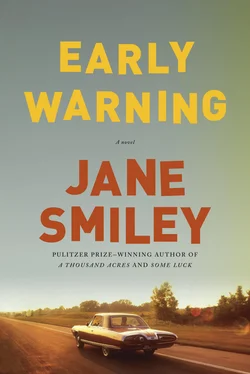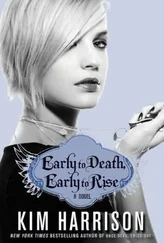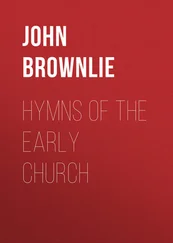Jane Smiley - Early Warning
Здесь есть возможность читать онлайн «Jane Smiley - Early Warning» весь текст электронной книги совершенно бесплатно (целиком полную версию без сокращений). В некоторых случаях можно слушать аудио, скачать через торрент в формате fb2 и присутствует краткое содержание. Год выпуска: 2015, Издательство: Knopf, Жанр: Современная проза, на английском языке. Описание произведения, (предисловие) а так же отзывы посетителей доступны на портале библиотеки ЛибКат.
- Название:Early Warning
- Автор:
- Издательство:Knopf
- Жанр:
- Год:2015
- ISBN:нет данных
- Рейтинг книги:5 / 5. Голосов: 1
-
Избранное:Добавить в избранное
- Отзывы:
-
Ваша оценка:
- 100
- 1
- 2
- 3
- 4
- 5
Early Warning: краткое содержание, описание и аннотация
Предлагаем к чтению аннотацию, описание, краткое содержание или предисловие (зависит от того, что написал сам автор книги «Early Warning»). Если вы не нашли необходимую информацию о книге — напишите в комментариях, мы постараемся отыскать её.
, a national best seller published to rave reviews from coast to coast.
Early Warning — читать онлайн бесплатно полную книгу (весь текст) целиком
Ниже представлен текст книги, разбитый по страницам. Система сохранения места последней прочитанной страницы, позволяет с удобством читать онлайн бесплатно книгу «Early Warning», без необходимости каждый раз заново искать на чём Вы остановились. Поставьте закладку, и сможете в любой момент перейти на страницу, на которой закончили чтение.
Интервал:
Закладка:
Then there was stuff about Rosa and her daughter, Lacey.
By midnight that night, Janet had forged a brief note from her mother: “Back from Florida the other day. See your Dad is still in Palm Springs. Guess the hotel is a mess, and he needs to stay for at least another week. By the way, Nedra is very ill, and she asked to see you. A Surprise. Don’t know what is going to happen, but you should come home this weekend, Love, Mom.” She’d stuck it in the envelope from an earlier letter, careful to tear off the postmark in a ragged way, as if she had ripped open the letter. When she took it to Miss Green, her housemother, the next day, she saw instantly what Aunt Eloise had been getting at. Miss Green barely glanced at the letter, just gave Janet a big smile and said, “Of course. Do you have train fare?” And, yes, she did.
The most adventurous part of Janet’s trip to New York was something she would not be telling Aunt Eloise: that she spent Friday night on a bench in Penn Station. She did fall asleep, but only for an hour or so, with her purse between her chest and the back of the bench and her arms through its handles. She was awake by the time the crowds began to trickle through the building, and when she saw two girls in pigtails walking with two guys in army-surplus jackets, with long hair, she followed them as they headed uptown.
When the protesters began to head out of Central Park to Fifty-ninth Street, Janet was toward the front. She didn’t dare speak to anyone, but she smiled several times and got smiles back. When they passed in front of the Plaza Hotel, where her mom had taken her for tea a couple of times, Janet looked east down Fifty-ninth Street; it hadn’t occurred to her until right then that there were lots of people she knew who might see her, even if everyone in her family was out of town. The barriers were jammed with old people gaping. The only shouting was coming from the protesters, who were screaming “End the war! Stop the bombing!” Janet screamed that, too. Aunt Lillian had said that Tim was killed by a grenade — a piece of shrapnel had entered the back of his head, and he died right away — and that was all Janet needed to know. She screamed until she was hoarse, thinking of Tim pitching balls to her when she was eight, and of herself striking out over and over until, finally, he tossed it right at the sweet spot where her bat was headed, and her bat hit it.
At some point, Janet realized that the tall white man and the shorter black man that she was right behind were Dr. Spock and Dr. King. There was a way in which Janet had not quite believed that Dr. Spock existed, like Betty Crocker or Aunt Jemima, but here he was, smiling and laughing, even when they passed a sign that read “Traitors!” And then she looked back. Because there was a little dip in the road, she saw the most thrilling sight she had ever seen, which was miles of people extending as far as it was possible to extend, into the buildings, into the clouds. They marched toward the East River, to the UN. The last time she was here was a field trip in sixth grade. She found herself a spot.
Janet was sure that Tim’s ghost was right there with her, practically touchable, a figure in the crowd, maybe standing behind the Vietnam Veterans Against the War’s placard. Tim had written her only one postcard from Vietnam, postmarked Nha Trang, and all it said on the back was “Hey, kiddo! Everything is fine here! Send me some more Hershey bars! Love you, Tim. xxx.” Aunt Lillian had let her read his last letter after she asked three times. Both she and Aunt Lillian knew that she would cry for days afterward, but that was good, according to her mom. As Phil Ochs sang “I Ain’t Marching Anymore,” Janet closed her eyes and mouthed the words, and imagined that it was Tim singing. Just as he had sung all those songs with the Colts.
—
THE APARTMENT WHERE Henry was staying for a long weekend, at Eighty-fourth Street and Broadway, had one window that faced east, and maybe Henry and Basil Skipworth heard the noise of shouting wafting on the breeze from the park, and maybe they didn’t. As the crow might fly, they were only a mile or so from where the protesters were gathering. They had talked about joining the march but had indulged themselves in not doing so. Thinking of Tim, Henry felt a little guilty. But when he came to New York, he’d somehow not put two and two together about the protest; he had been thinking of this weekend as a break from everything about Tim that was putting his mother and Claire and Paul and Lillian — and himself, for that matter — at loggerheads. Basil taught German at Yale. Even though he often said “my dear boy,” he was two years younger than Henry and about six times more sophisticated, if by that you meant that he read Balzac in French and Boccaccio in Italian as well as Goethe in German (and Kafka, too). On the other hand, he had only the most rudimentary grasp of the etymology of “foot” ( fot, föt, pes (Latin), pod (Greek), pada (Sanskrit), — ped (Indo-European), much less that of “penis,” which meant “tail” in Latin and was almost unchanged from earlier forms. Basil, who had gone to Cambridge, was much more sophisticated than Henry in many ways, but, they both knew, not nearly as good-looking. He had started subtly pursuing Henry at the Modern Language Association meeting in December. Henry had allowed capture in March, intrigued by Basil’s courage, since he himself had never been bold enough to push any pursuit to its logical end. They were using an apartment belonging to some friend of Basil’s, who was back in England for a month.
Basil was completely up to date on sodomy laws: In England, still illegal, penalty, no longer death, but imprisonment, as for Oscar Wilde. Wilde, according to Basil, had been convicted under the same law that made the age of consent for females twelve; “however, my dear boy, for us, no consent is possible. I guess it is a sign of progress that, as of a hundred years ago, a man could be jailed for fucking a girl who wasn’t quite ten yet, but the wheel of progress moveth exceeding slow.” Nor could they meet in Connecticut, where homosexuality meant prison if the judge felt like it. Illinois — didn’t Henry know this? — was the most progressive. As for New York, well, buggery was only a misdemeanor, and with all of these draft dodgers in town, the police had their hands full.
“Buggery,” “balls-up,” “bollocks,” “git,” “ponce,” “poofter,” “rodger,” “wanker,” “stiffy,” “todger,” “stonker.” Listening to the words Basil enunciated in his layered accent (West Country underneath Received Pronunciation — he almost always pronounced his “r”s, for example, and sometimes joked around, saying, “Where ye be goin’ to?”), Henry got used to them as if they were jokes, as if what Basil was showing him wasn’t a little scary (“Oh, my dear boy, we’ve not got to that part yet”). Henry knew that Basil sometimes put on the West Country pretty thick just for him, because that was where the purest Anglo-Saxon still resided. Basil laughed at him for caring about such elementary linguistic motes and crumbs, compared with Death in Venice , or at least Doktor Faustus , which had universal appeal. Henry’s standard riposte was, had Doktor Faustus , finished only twenty years ago, really stood the test of time? He was willing to admit that Christopher Marlowe’s The Tragicall History of the Life and Death of Doctor Faustus had features of interest that might prove lasting, but…
And then they started laughing. Basil said, “My God, you are a stuffy fellow, for all that length of leg.”
Henry was naked. The windows of the bedroom looked south, onto a tiny little square of green surrounded by cats and flowerpots. The apartment was on the third floor, and there were blinds; Basil had drawn them but not closed them. Henry supposed that north-facing windows across the alley had a view of their misdemeanors. They had kissed. They had stroked. Basil had warmed some baby oil and started at his shoulders, then moved farther down, lingering over Henry’s arse, admiring the fact that Henry’s body hair was fine and blond. Henry had rubbed Basil down, also, lingering a little around his shoulder blades before descending to the arse (hairy, not like any girl Henry had known). Until now that was all they had done, besides sleep side by side, though Henry wore shorts and a shirt and Basil wore pajamas (a word that was, indeed, related to “penis”). Basil had buggered and been buggered by, but he was patient. When Henry visited in March, Basil had walked around the apartment naked, sometimes with an erection, and he had done nothing with it except touch it from time to time, letting Henry get used to it. Watching him, without saying anything, Henry had imagined Jacob Palmer doing the same thing. Jacob had finished his doctorate at Wisconsin — highly motivated by the cold, he said — and was now married to one of his fellow graduate students, a Yeats scholar from St. Paul. They had a six-month-old baby boy. Jacob had gotten a good job at UCLA.
Читать дальшеИнтервал:
Закладка:
Похожие книги на «Early Warning»
Представляем Вашему вниманию похожие книги на «Early Warning» списком для выбора. Мы отобрали схожую по названию и смыслу литературу в надежде предоставить читателям больше вариантов отыскать новые, интересные, ещё непрочитанные произведения.
Обсуждение, отзывы о книге «Early Warning» и просто собственные мнения читателей. Оставьте ваши комментарии, напишите, что Вы думаете о произведении, его смысле или главных героях. Укажите что конкретно понравилось, а что нет, и почему Вы так считаете.











